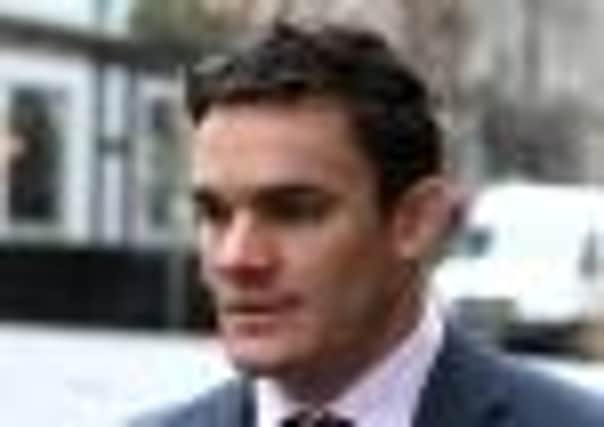Max Evans trial: It’s great to be back, says cleared rugby internationalist


Mr Evans, 28, had sworn he acted in self-defence when Alasdair McCaig, 29, landed a blow first in the VIP lounge of the Lulu club in Edinburgh’s George Street, and that he forgot he was holding the glass.
The jury of nine women and six men at Edinburgh Sheriff Court took less than an hour to return a majority not guilty verdict. Mr Evans remained outwardly calm as he sat in the dock, but rocked slightly and his shoulders heaved as the relief swept over him.
Advertisement
Hide AdAdvertisement
Hide AdOutside, with his girlfriend, Katy Johnson, 23, an actress from Los Angeles, at his side, Evans said: “Obviously I am very pleased, and I appreciate the jury’s verdict.”
He added in a statement: “It’s been a challenging time for me and my family and friends, and I would like to thank everyone who has been supportive over the recent weeks and months. I would also like to thank the jury for their diligence in reaching their verdict.
“I will now put this behind me and be very focused on my rugby. It’s great to be back in the Scotland camp today with the players, coaches and management, and I’m undertaking training this afternoon.”
The incident occurred in the early hours of 1 August, 2010, when Mr Evans played his club rugby for Glasgow Warriors. He has since joined Castres in France. He had gone to the nightclub with two Glasgow and Scotland teammates, Graeme Morrison and John Barclay.
He was invited by staff into the lounge, which is normally reserved for clubbers with “ambassador membership”. At the time, Mr Evans had no girlfriend, and he spent time with a young woman, Sarah Jane Bell, 28, a nanny.
Mr McCaig, a property developer, was at the club with his sister and a friend. According to him, he was chatting and sipping champagne when, out of the blue, someone approached and struck him in the face and “hastily exited” the room.
Mr McCaig rejected suggestions that he had either verbally insulted or physically attacked Mr Evans before being assaulted. He told the court that the glass smashed near his right eye and blood poured from a wound. Although the cut did not require stitching, he had been left with a scar hidden by his eyebrow and, more seriously, nerve damage which had left a numb sensation to part of his forehead.
“You could put a pin in it and not feel it,” said Mr McCaig, adding that a consultant had advised him the damage could not be repaired but might heal in time.
Advertisement
Hide AdAdvertisement
Hide AdMr Evans gave a vastly different account, of being insulted by Mr McCaig, who had referred to him and his brother, Thom, as “f******” . Mr Evans said he did not react until Mr McCaig swung a blow which landed to his shoulder and his face.
He feared he would be hit again, and added: “I put my hand out to push him away… to defend myself… I did not realise I had the glass in my hand.”
Mr Evans was charged with assaulting Mr McCaig to his severe injury and permanent impairment, and pleaded self-defence.
In his closing speech to the jury, the depute procurator-fiscal, Dev Kapadia, asked for a guilty verdict but with a rider that Mr Evans had acted under provocation.
Mr Kapadia argued that “in a moment of madness”, Mr Evans had “lost it”. All the victim had done was abuse him, “unpleasant though it might have been”.
Defence counsel Kevin McCallum submitted that Mr Evans had been trying to ignore Mr McCaig’s jibes, but he reacted after Mr McCaig had aimed a blow which struck his shoulder and up to his face.
“He defended himself against physical assault and the use of the glass was unintentional. Did he for one minute appear to you to be the type of man to deliberately strike another man in the face with a glass?” Mr McCallum asked the jury.
Sheriff Jarvie told the jurors that Mr Evans must be acquitted if they accepted he had been acting in self-defence, because it was a complete defence to the charge. On the other hand, provocation merely mitigated or lessened the accused’s behaviour.